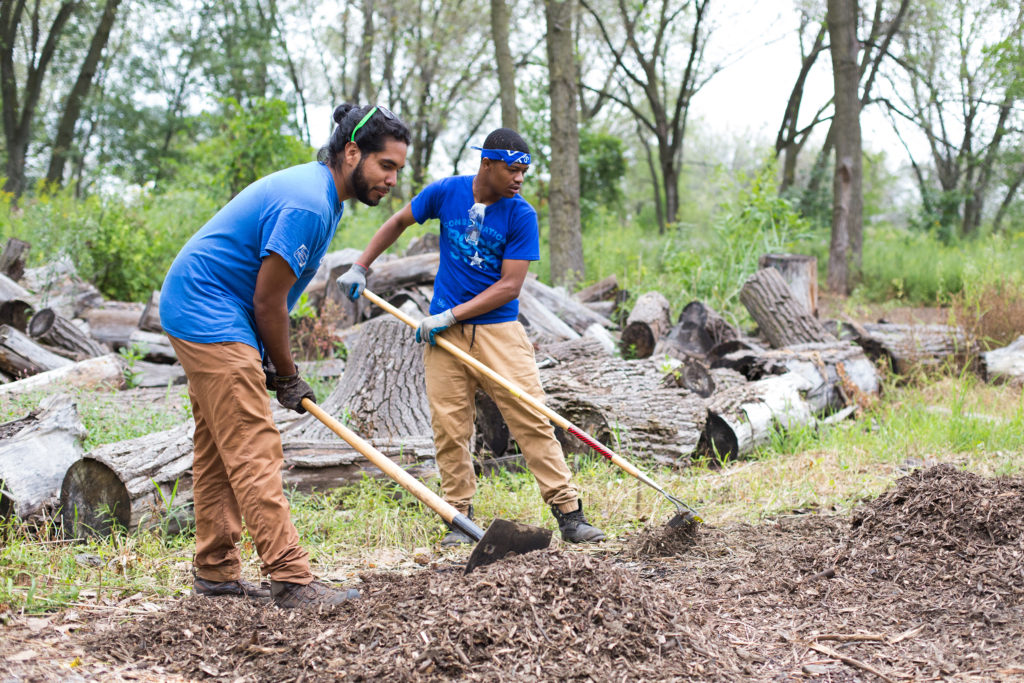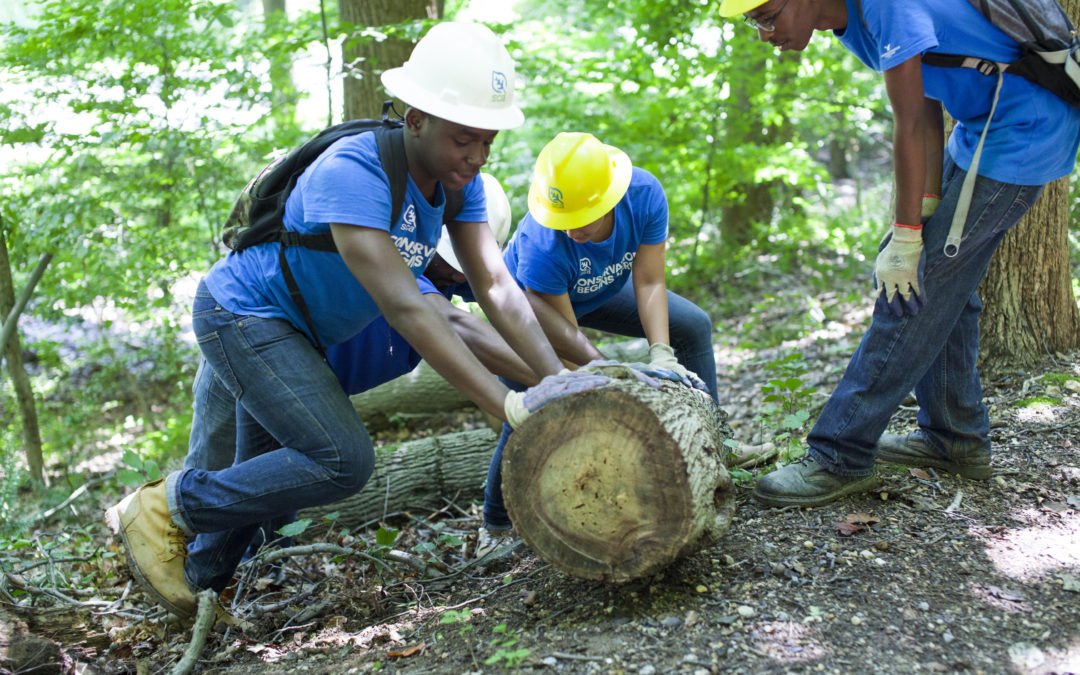By Alejandra Pallais, Senior Director, Marketing and Constituent Engagement, Student Conservation Association
Who would have thought there was a connection between land restoration and success in school? This is precisely what research concerning the Student Conservation Association (SCA) has found. In partnership with the Search Institute, a globally-recognized leader in youth development research and practice, recent studies have shown that SCA programs not only deepen a young person’s connection to nature, which we assumed was happening, but they also develop critical life skills that help them succeed in school and work well into the future.
According to the research, students emerged from a single summer SCA experience with:
- A greater sense of social responsibility.
- Keener leadership skills.
- Improved interpersonal and communication skills.
- A stronger thriving mindset and perseverance.
- A deeper commitment to understanding others and working collaboratively.
Even years after their SCA experience, half of SCA alumni say that perseverance and hard work are among the top three skills they learned with SCA and continue to use in their daily lives. Research shows that when young people have this “grit” to pursue long-term goals with passion and perseverance, they are more successful in life, regardless of talent or intelligence.
Taken together, these skills will empower young people with an ethic of stewardship to be effective and influential conservation and community leaders who take on the greatest challenges of our time in their careers and in their everyday lives – environmental or otherwise.
Although there may not always be an immediate connection between land restoration and the power of youth, this is the premise in which SCA was founded.
In 1957, SCA’s founder Liz Putnam saw a critical need in the conservation world. She read an article talking about how our national parks were being neglected. She was astounded. She felt our national parks were America’s iconic natural wonders. If these natural places were not being protected, then what did that signify for the rest of the environment?
At the same time, she also saw passionate young people, searching for a way to connect and contribute to something greater than themselves. She saw the potential that youth had to create change, if only that potential was properly harnessed.
She decided to bring the two together: Tap into young people’s passion and energy as well as their innate desire to be part of something greater than themselves. She took this passion and directed it toward addressing one of the biggest conservation needs of her time: the restoration of our national parks, America’s natural legacy.
That premise continues to guide everything we do. It is who we are. We empower young people with the skills, training, and opportunity to address “real” conservation challenges. They do not do this theoretically. They do it through hands-on, real work experience. We harness their passion and energy to contribute productively to something greater than themselves – the restoration and preservation of our land, and ultimately the protection of our natural resources.
Sixty years later, nearly 80,000 young people have had this experience, an experience that allows them to see the potential they have in creating real change – through service to nature.
Perhaps this connection is best explained through the words of our members:
“From there on, things were different for me. I wanted to pursue a life that allowed me to see all the magnificent wonders that this nation, and even further beyond, had to offer. And I wanted to help keep them magnificent too.”
“I had realized that national parks and the outdoors belong to every single one of us. Every mountain, waterfall, canyon, trail, tree ….. We must only be willing to reach out to it.”
“I have become proud of the work I and my team have done. I feel like I’m a part of something bigger than… hearing commercials on how we need to make a difference, wanting to, but never acting on it.”
Yet despite the potential that nature has to empower youth, children today spend half as much time outdoors as they did 20 years ago, while the average American teenager spends more than seven hours a day in front of an electronic screen. How do we offer young people more opportunities to connect with nature and with the deeper potential within themselves?
SCA partners with a wide range of private and public organizations, including federal, state, and local government agencies; nonprofit and for-profit organizations; philanthropic donors; and educational institutions to ensure that we can continue to provide these experiences to young people. Through these partnerships, we can offer the following programs:

Photo|Student Conservation Association
YOUTH PROGRAMS (15 -19)
SCA offers a range of programs for youth ages 15-19. Youth can join an SCA summer camping crew or a local commuting crew. Crews are team-based programs led by SCA trained young adult crew leaders. Crews work together to accomplish a specific hands-on conservation project either in an urban or backcountry setting.
The two types of crew need to buy ambien opportunities are:
? Conservation Crews: Up to eight high school students serve under two SCA Leaders, completing labor-intensive, resource management projects during the summer, in front-country or backcountry locations. Not only do students participate in trail maintenance and restoration projects, but they learn practical outdoor skills, become acquainted with the local wildlife, and help preserve vital habitats.
? Community Crews: Urban high school students work in their home communities, completing summer conservation projects, gaining knowledge of environmental issues, and learning green jobs skills under the direction of two SCA Leaders. Activities vary by location, but can include trail building, habitat restoration, and invasive species removal.
YOUNG ADULT PROGRAMS (18 +)
Our young adult programs range in skills, requirements, and opportunities. We offer both individual internships and team-based Corps opportunities. The jobs can range from leading public programs as a park ranger, trekking the backcountry as a ?eld scientist, or exploring new sustainability solutions as an urban planner.
Our young adult programs typically fall under two main categories:
? Conservation Internships: College students and young adults serve from 12 weeks to 12 months in a broad array of disciplines, meeting partner goals while gaining practical career experience. Recent internship opportunities include:
o Sustainable Operations Intern
o Backcountry Ranger Intern
- Environmental Education Intern
- Maintenance/Wetlands Management
- Preservation Skills Development Intern
- Natural Resource Intern
- Trail Crew/Trail Interns
- Invasive Species Technician
- Wilderness Backcountry Intern
? Conservation Corps: College and graduate students team up to complete large-scale resource management initiatives, directed by an SCA Project Leader. Many Corps programs take place in the backcountry, where students build trails, prevent forest fires, or restore critical habitat. Examples include:
o The Adriondacks AmeriCorps Program: A five month internship that focuses on trail maintenance and construction. Projects include new trail construction, extensive timber bridge construction, dry stone masonry, removal of invasive vegetation, ?re tower rehabilitation, historic building restoration, and trail maintenance.
- The Desert Restoration Corps Program: A ten month internship that focuses on monitoring, preserving, and repairing fragile habitat in the Mojave and Colorado Deserts of Southern California. Students can expect to engage in projects like habitat restoration, fence/barrier construction, public outreach, trail work/assessment, invasive species management, and resource (i.e. water, wildlife) monitoring.
- The Phoenix Field School: A 16-week education and training program for young adults ages 18-21 that provides opportunities to gain meaningful, hands-on conservation experience through a variety of ?eld-based projects, trainings, and certi?cations. The crews work on important conservation projects in Arizona, including trail construction and repair, riparian habitat restoration, biological monitoring, and invasive plant management.
GAP YEAR PROGRAMS
Many of SCA’s programs fall within the realm of a gap year opportunity. Both our individual internships and many of our Corps opportunities allow a recent high school graduate to explore the field of conservation, gain a deeper understanding of career paths, and more importantly develop a greater sense of social responsibility, leadership skills, and grit.
FIELD LEADERS (ages 21 +)
SCA also offers short- and long-term paid positions leading youth or young adults in SCA conservation crews and projects. These short-term paid positions are not just about supervising youth but about mentoring, motivating, and inspiring. Along the way, participants gain conservation skills and expertise in areas as diverse as trail building, habitat restoration, ?re management, and visitor outreach.
SCA’s one-day service events are opportunities for community members and people of all ages to give back and help restore their local parks and green spaces. SCA’s service events are great opportunities for schools and parents to introduce youth to hands-on volunteer opportunities in nature. SCA partners closely with elementary and high schools, as well as other youth service organizations who are interested in bringing groups out to get an initial exposure to what it means to serve our planet.
If we are to truly solve the complicated and varied environmental challenges of our day, it will require the right combination of grit, social responsibility, and leadership skills coupled with a deep commitment to conservation, precisely the skills that SCA programs provide. We can look to a future where young people feel empowered and are able to address what only seem like insurmountable challenges. Given the right experience, SCA believes that today’s young people can become tomorrow’s conservation leaders. If we focus on addressing the need to restore our land AND provide youth with the life skills they need, SCA has no doubt that young people have the power to create true change for the future of our planet.
About the Author
Alejandra Pallais is the Senior Director of Marketing and Constituent Engagement with the Student Conservation Association (SCA) where she aims to engage a broad range of audiences in SCA’s mission of developing the next generation of conservation leaders. Her goal is to connect people who believe in conserving our natural places and who believe in the potential of young people with SCA. She brings an extensive background in experiential education, marketing, and communications to this role.

